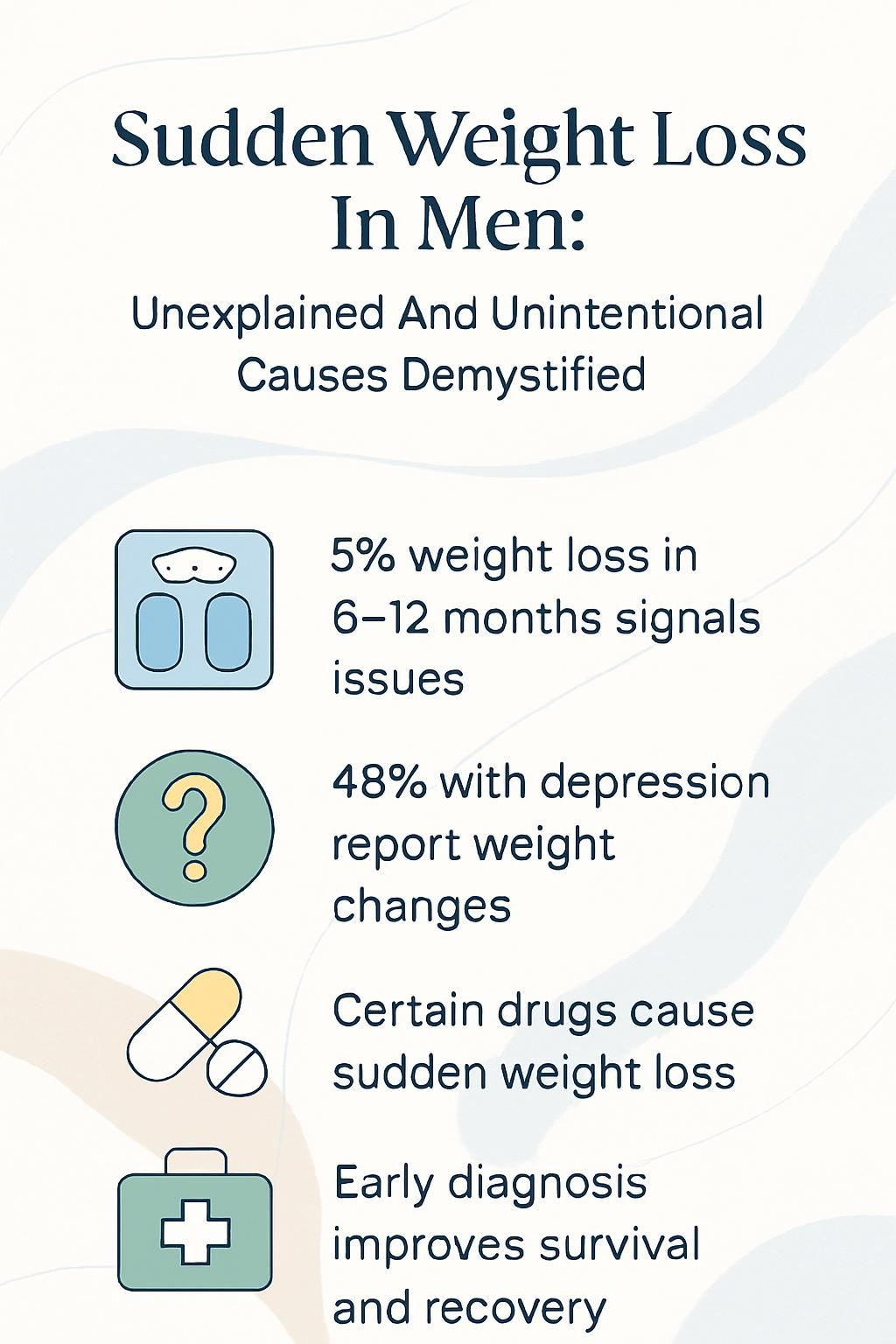Sudden Weight Loss In Men: Unexplained And Unintentional Causes Demystified
Our Nutrition Assistant AI Suite will transform your body. You will lose fat, get toned, and build muscle. Gain confidence and optimal health.
If you notice sudden weight loss in men and you are not trying to slim down, it can feel alarming. Unintentional weight loss, especially in older adults, may point to an underlying condition. Early evaluation matters.
This guide explains possible causes, common signs, and smart next steps if you experience unexplained weight loss. Learn what to watch for and when to seek care.
Key Takeaways
- Unintentional weight loss of 5 percent or more within 6 to 12 months can signal serious problems such as diabetes, cancer, or thyroid disease (Mayo Clinic, 2022).
- Mental health conditions like depression and anxiety can reduce appetite, and nearly half of people with depression report weight changes.
- Prescription drugs, including metformin, GLP-1 agonists, and some antidepressants, can trigger unexpected weight loss; report changes to your doctor.
- Fast medical evaluation improves outcomes if weight loss occurs with red flag symptoms like fatigue, chest pain, or bowel changes.
- Weight loss with fever, night sweats, weakness, or blood in stool needs urgent medical attention.

What is Sudden Weight Loss in Men?

Sudden weight loss in men means you lose pounds quickly without dieting or extra exercise. This often suggests a health condition that needs medical evaluation.
What does sudden weight loss mean?
Losing weight without trying can indicate illness. Doctors usually define sudden or unexplained weight loss as losing 5 percent or more of your body weight within 6 to 12 months.
For a 200-pound man, that is at least 10 pounds. This level of loss deserves attention, especially in older adults. Possible causes include diabetes, cancer, thyroid disorders, and digestive diseases such as celiac disease or Crohn’s disease.
Large or rapid changes can harm nutrition and reduce muscle. They may also lower energy and mood.
Unintentional weight loss that reaches 5% of your total weight over six to twelve months always deserves a closer look by a primary care physician.
How do intentional and unintentional weight loss differ?
Intentional weight loss follows a plan, like cutting calories or increasing activity. The goal is clear and progress is tracked.
Unintentional weight loss happens without effort or a plan. It often comes with other concerns such as a poor appetite, fatigue, or weakness. Medical or mental health conditions may be the cause. If pounds drop and your habits have not changed, schedule a visit with your doctor.
Common Causes of Sudden Weight Loss in Men
Many medical and psychological factors can cause rapid, unplanned weight loss. Knowing the common causes helps you decide when to seek help.
Medical conditions causing sudden weight loss
Unexplained weight loss can be the first sign of disease. The conditions below need careful evaluation and timely care.
- Diabetes can cause fast weight loss if your body cannot use sugar for energy, leading to muscle loss and frequent urination.
- Thyroid disorders, especially hyperthyroidism, may cause unexpected loss because excess thyroid hormone speeds metabolism.
- Cancer can cause weight loss before other symptoms, including colorectal and pancreatic cancers.
- Digestive diseases such as Crohn’s disease, ulcerative colitis, peptic ulcer disease, and celiac disease can reduce nutrient absorption and trigger diarrhea, nausea, or wasting.
- Addison’s disease affects the adrenal glands and lowers cortisol and aldosterone, causing weight loss, fatigue, and weakness.
- Chronic infections like tuberculosis or HIV often lead to ongoing inflammation, loss of appetite, and weight loss.
- Chronic kidney or liver disease may reduce appetite or cause nausea and vomiting, leading to ongoing loss of weight.
- Mental health conditions, including depression, anxiety, anorexia nervosa, and bulimia nervosa, can reduce intake and contribute to weight loss.
- Heart failure or chronic lung disease can make eating difficult due to fatigue or shortness of breath, which may reduce intake.
- Pancreatitis limits digestion and absorption, leading to nutrient deficits and unintended weight loss.
Each condition affects the body differently, yet all can cause weight loss that needs diagnosis and treatment.
How does diabetes lead to weight loss?
With diabetes, your body struggles to move glucose from the blood into cells. In type 1 diabetes, there is little or no insulin. In type 2 diabetes, insulin may not work well. When cells cannot use sugar, your body burns fat and muscle for fuel. That causes unintentional weight loss.
Common signs include thirst, frequent urination, and blurred vision. Quick weight changes call for blood sugar testing and care.
What thyroid disorders cause weight loss?
Hyperthyroidism can lead to fast weight loss. The thyroid makes too much hormone, speeding up your metabolism and calorie burn. Intake may not change, yet the scale drops.
Graves’ disease is a frequent cause. Anxiety, tremors, sweating, and a rapid heartbeat may occur. Blood tests, such as TSH, and imaging help confirm the diagnosis. Early treatment protects muscle and energy.
Can cancer cause unexplained weight loss?
Yes. Many cancers disrupt appetite and metabolism. Tumors can release substances that suppress hunger or change taste. Loss of 10 pounds or more without trying is a common early sign in some cancers, including stomach, lung, and colon cancer.
Doctors may recommend screening and tests such as colonoscopy, CT, MRI, or blood work. Early detection improves treatment options and recovery.
Which digestive diseases affect weight loss?
Several digestive conditions reduce nutrient absorption or make eating painful.
- Celiac disease causes an immune reaction to gluten, which damages the small intestine and limits absorption.
- Crohn’s disease and ulcerative colitis inflame the gut. Pain, diarrhea, and poor absorption can cause rapid loss.
- Chronic pancreatitis weakens digestion of fats and proteins, which leads to calorie loss.
- Difficulty swallowing, called dysphagia, reduces intake and can speed weight loss.
Digestive diseases may explain a large share of unexplained weight loss in adults, according to research from the National Institutes of Health. Testing guides treatment and helps you regain nutrition.
How do psychological factors contribute to weight loss?
Mental health and body weight are closely linked. Stress, mood changes, and habits can lower intake and raise calorie burn.
- Depression often reduces appetite and interest in food or daily activities.
- Anxiety can cause queasiness and restlessness, which raises calorie use and lowers intake.
- Eating disorders, such as anorexia nervosa and bulimia, involve restriction or purging that leads to loss.
- Some psychiatric medicines decrease appetite, which can lower calorie intake.
- Major life stress can disrupt routines and meals.
If mood symptoms appear with rapid weight changes, seek care. Treating the mind often helps the body recover.
What role does depression play in weight loss?
Depression commonly causes unexplained weight loss in men. Appetite can fade and food may lose its appeal. Some people also notice changes in taste or smell that reduce interest in eating.
About 48 percent of people with depression report weight changes. Screening and treatment, including therapy and medication, can restore appetite and protect nutrition.
Can anxiety cause sudden weight loss?
Yes. Ongoing anxiety raises stress hormones like cortisol and adrenaline. These hormones increase heart rate and breathing, which can burn more calories. Anxiety can also upset digestion and cut appetite.
If anxiety and weight loss occur together, contact a clinician. They can rule out other problems and suggest treatment that supports both mental health and nutrition.
How do eating disorders cause weight loss?
Eating disorders change how you eat and view food. With anorexia nervosa, intake becomes too low to meet the body’s needs. With bulimia, purging cuts calorie absorption. Over-exercising can worsen the calorie gap.
Weight loss of 5 percent or more in 6 to 12 months without a clear reason should trigger screening for disordered eating. Early care improves outcomes.
How do medications and treatments affect weight?
Some drugs and therapies lower appetite, upset the stomach, or speed metabolism. Weight can drop quickly if intake falls or absorption weakens.
- Prescription drugs for mood, diabetes, and other conditions may cause weight loss. Ask about side effects.
- Chemotherapy and radiation can reduce appetite and cause nausea or diarrhea.
- Levothyroxine for low thyroid can cause loss if the dose is too high.
- Some medicines change bowel habits, which can reduce intake and absorption.
- Diuretics and some heart medicines can reduce water weight quickly.
- Several psychiatric medicines may lower appetite and reduce total calories.
- Treatments for autoimmune or digestive disease can hinder absorption, which can cause loss.
Knowing this risk helps you track changes early and adjust care with your clinician.
What prescription drugs cause weight loss as a side effect?
Several medications are known to reduce appetite or calorie absorption.
- Metformin can blunt appetite and lead to mild weight loss.
- GLP-1 agonists such as semaglutide and liraglutide reduce hunger and often cause loss.
- Bupropion, an antidepressant, may lower appetite and reduce intake.
- Stimulants for ADHD, including methylphenidate and amphetamine, commonly suppress appetite.
- Chemotherapy often cuts intake and can alter taste or bowel habits.
- Topiramate, used for migraines or seizures, can decrease appetite.
- Thyroid medicines like levothyroxine can change weight if dosed incorrectly.
- Some antibiotics and antifungals upset the stomach and reduce intake.
- Antiretroviral medicines may affect appetite and nutrition.
- Diuretics cause water loss that can look like sudden weight change.
- Orlistat blocks fat absorption and can cause nutrition gaps if misused.
If your weight drops after starting a new drug, call your doctor. A dose change or alternative may help.
How do chemotherapy and radiation therapy cause weight loss?
These treatments target fast-growing cancer cells. Healthy cells in the mouth, stomach, and intestines can be affected too. That often leads to nausea, mouth sores, diarrhea, and fatigue. Appetite can fade and absorption can drop, which causes weight loss.
Taste and smell may also change. Nutrition support during treatment helps you keep strength and muscle.
What lifestyle factors lead to sudden weight loss?
Daily habits can push your calorie balance into a deficit. Small changes add up over weeks.
- Skipping meals reduces calories below what your body needs.
- Poor diet quality can cause malnutrition and muscle loss.
- High training loads raise calorie burn faster than many people can replace.
- Stress can suppress appetite and disrupt meals.
- Heavy alcohol use irritates the gut and lowers intake.
- Smoking reduces appetite and may speed metabolism.
- Poor sleep alters hormones that regulate hunger and fullness.
- Some treatments list weight loss as a side effect.
- New restrictive diets can cut calories too far if not planned well.
- Frequent urination, a sign of diabetes, can lead to quick water loss.
Tracking meals, sleep, and activity for two weeks can reveal patterns that drive weight change.
Can poor diet or malnutrition cause weight loss?
Yes. The body needs enough calories, protein, vitamins, and minerals to maintain muscle and energy. Without them, weight and strength fall.
Common signs include low appetite, fatigue, and trouble concentrating. Digestive diseases can worsen malnutrition by limiting absorption. Pairing a balanced diet with treatment of any medical cause helps stop the slide.
How can excessive physical activity cause weight loss?
Intense or long workouts raise calorie needs. If intake does not match output, the body burns stored fat and then muscle. Over time, strength and recovery suffer.
Endurance athletes often need careful meal planning and regular snacks. Monitoring weight, energy, and performance can signal when to increase calories.
What Symptoms Accompany Unexplained Weight Loss?
Unintentional weight loss often comes with other clues. Tracking these symptoms helps your doctor find the cause faster.
Why does fatigue occur with weight loss?
Fatigue can develop when intake drops below your needs. Muscles rely on glucose for energy. Low calories and poor absorption reduce fuel and stamina. Medical conditions like celiac disease, diabetes, and thyroid disorders can magnify fatigue.
Loss of lean muscle makes daily tasks harder. Treating the root cause and rebuilding protein intake restores energy over time.
How does loss of appetite relate to sudden weight loss?
Loss of appetite leads to fewer calories, which creates a deficit. Illness, stress, and certain medicines can dull hunger signals. Digestive disease may reduce hunger and absorption at the same time.
Over weeks, intake falls behind needs and the scale drops. If poor appetite lasts beyond two weeks, contact your clinician.
What changes in bowel habits indicate weight loss issues?
Ongoing diarrhea, constipation, or swings between the two can signal trouble. Pale or oily stools suggest poor fat absorption. Blood in stool needs urgent care and may relate to ulcers or colon cancer.
These changes, especially with weight loss, call for testing. Early care protects nutrition and health.
Why does muscle weakness happen with unexplained weight loss?
When calories and protein are low, the body breaks down muscle for energy. Diseases that raise metabolism or reduce absorption can speed this process.
Weakness improves when treatment addresses the cause and when protein, calories, and resistance exercise rebuild muscle.
What causes night sweats or fever alongside weight loss?
Fever and night sweats can signal infection or cancer. Tuberculosis, HIV, and some heart infections can present with this trio of symptoms. Lymphoma and autoimmune disease can also cause these signs.
Track timing and severity. Share this information with your clinician right away.
When Should Men See a Doctor for Sudden Weight Loss?
Unplanned weight loss deserves attention. A doctor can help identify the cause and guide treatment before complications grow.
What warning signs require immediate medical attention?
Seek urgent care if you notice any of the following:
- More than 5 percent body weight lost within six months.
- Severe fatigue or muscle weakness along with weight loss.
- Fever, night sweats, or chills with ongoing loss.
- Changes in bowel habits such as persistent diarrhea, black stools, or blood in stool.
- Loss of appetite lasting longer than two weeks.
- Shortness of breath, chest pain, or heart palpitations with weight loss.
- Difficulty swallowing, frequent vomiting, or severe abdominal pain.
- Signs of dehydration such as dry mouth, dizziness, and fast weight drop.
Early care can prevent complications and improve recovery.
Why is early diagnosis important for sudden weight loss?
Early diagnosis finds serious causes while they are more treatable. Starting care sooner can prevent malnutrition, preserve muscle, and improve energy. A 2022 review from Mayo Clinic reported better outcomes when evaluation happened within six months.
Timely tests guide targeted treatment. That helps you stabilize weight and feel better faster.
What Diagnostic Tests Identify Causes of Sudden Weight Loss?
Doctors use your history, a physical exam, and tests to pinpoint the cause. Results shape an effective treatment plan.
How does a physical examination help diagnose weight loss?
A careful exam checks for muscle loss, rapid heartbeat, swollen lymph nodes, jaundice, and signs of dehydration or infection. Your clinician listens to your heart and lungs and looks for patterns that suggest thyroid, liver, or kidney problems.
They will also review appetite, activity, and medications. These clues guide the next tests.
Which blood tests are used to find the cause of weight loss?
Blood work helps reveal or rule out many conditions tied to unintentional weight loss.
- Complete Blood Count checks for anemia, infection, and some blood cancers.
- Thyroid tests, including TSH, T3, and T4, identify overactive or underactive thyroid.
- Blood glucose and HbA1c screen for diabetes or poor control.
- Liver panel looks for liver disease that can affect appetite and metabolism.
- Kidney panel, including creatinine and BUN, checks kidney function.
- Inflammatory markers such as CRP and ESR suggest inflammation or chronic illness.
- Electrolytes and a basic metabolic panel flag dehydration or metabolic issues.
- Tumor markers, in select cases, help investigate certain cancers.
- HIV and hepatitis tests check for chronic infections linked to weight loss.
Results point to the next steps, such as imaging or referral to a specialist.
What imaging studies detect causes of sudden weight loss?
Imaging looks inside the body for hidden problems that explain weight loss.
- Chest X-rays reveal lung infections and masses.
- CT scans create detailed pictures of organs and tissues to find cancers, infections, or digestive disease.
- MRI shows clear soft tissue detail in the brain, spine, and abdomen.
- Ultrasound evaluates organs like the liver, kidneys, and pancreas for abnormalities.
- PET scans highlight abnormal metabolic activity that may suggest cancer.
- Bone scans identify bone infection or tumor spread.
- Barium studies examine the esophagus, stomach, and intestines for blockages or growths.
These images guide diagnosis and help plan treatment.
When is endoscopy needed for gastrointestinal evaluation?
An endoscopy allows doctors to view the esophagus, stomach, and intestines using a thin camera. It is useful when weight loss occurs with digestive symptoms such as ongoing pain, difficulty swallowing, blood in stool or vomit, chronic diarrhea, or unexplained anemia.
If blood tests or imaging do not explain the loss, endoscopy can detect ulcers, inflammation, celiac disease, and tumors.
What Are the Treatment Options for Unintentional Weight Loss?
Treatment focuses on the cause and on restoring nutrition and muscle. Your plan may include medicines, nutrition support, and counseling.
How are underlying medical conditions treated?
Care depends on the diagnosis. The goal is to control the disease and stabilize weight.
- Medicines manage conditions like diabetes, thyroid disorders, and infections.
- Cancer care can include surgery, chemotherapy, or radiation.
- Digestive diseases may need diet changes, anti-inflammatory drugs, or enzymes.
- Mental health treatment, including therapy and medication, can restore appetite and routine.
- Hormonal disorders such as hyperthyroidism need medications that slow thyroid activity.
- Doctors adjust medicines if side effects cause weight loss.
- Registered dietitians design higher calorie, higher protein meal plans.
- Support groups and follow-up visits help you stay on track.
- Repeat tests monitor progress and guide changes to the plan.
Most people regain strength with consistent care and a steady meal plan.
What psychological therapies help with weight loss?
Cognitive behavioral therapy helps you challenge unhelpful thoughts and build healthier eating patterns. Interpersonal therapy addresses relationship stress that may affect appetite and routine.
Group support can reduce isolation and increase motivation. Mindfulness skills help you notice hunger and fullness, then respond with balanced choices.
How can nutritional support aid in weight gain?
Nutrient-dense foods rebuild muscle and body stores. Aim to eat more calories than you burn each day, focusing on protein and healthy fats.
Helpful options include eggs, dairy, poultry, fish, beans, nuts, olive oil, and avocado. Small, frequent meals and calorie-rich snacks work well when appetite is low. Smoothies and shakes make intake easier on days when solid food is a struggle. A registered dietitian can tailor a plan to your needs.
How Can Sudden Weight Loss Be Prevented?
Prevention starts with steady habits. A balanced diet, routine checkups, stress control, and medication reviews reduce risk.
Why is maintaining a balanced diet important?
A balanced diet supplies energy, protein, vitamins, and minerals your body needs. Good nutrition supports immunity, organ function, and muscle strength. Research shows men who eat fruits, vegetables, whole grains, and lean proteins have a lower risk of malnutrition and related weight loss.
Here is a simple daily target list for adult men ages 19 to 50:
| Nutrient | Daily Need | Example Sources |
|---|---|---|
| Protein | 56 grams | Chicken, fish, beans |
| Vitamin C | 90 mg | Oranges, bell peppers |
| Iron | 8 mg | Beans, lean beef, spinach |
| Fiber | 38 grams | Oats, brown rice, berries |
Balanced meals protect against unwanted weight loss and help maintain energy.
How do regular health check-ups help prevent weight loss?
Routine visits catch problems early. Your doctor can check blood sugar, thyroid levels, and other markers before symptoms grow severe. These visits are also a chance to discuss appetite, sleep, mood, and new medications.
Tracking your weight over time helps spot trends. Adjustments can be made sooner, which reduces complications.
What are effective methods for managing stress?
Stress management supports steady eating and better sleep. Try these practical steps:
- Practice deep breathing for five minutes daily to lower tension.
- Exercise most days. About 150 minutes weekly can lift mood.
- Use mindfulness or short meditation to ease daily stress.
- Take brief breaks during long work blocks to prevent burnout.
- Keep a consistent sleep schedule to stabilize energy and appetite.
- Connect with friends and family for support.
- Limit caffeine and alcohol to protect sleep and mood.
- Set small, realistic goals to avoid overwhelm.
- Use creative outlets such as music or writing to relax.
- Challenge negative thoughts with balanced, fact-based ones.
How should medications and side effects be monitored?
Keep a daily list of all drugs and supplements. Note appetite, stomach symptoms, energy, bowel changes, and weight. Share this information at each visit.
Ask which side effects to expect and what to report quickly. Blood tests and checkups can catch issues early. Your care team can adjust doses or suggest safer alternatives.
Conclusion
Sudden or unexplained weight loss can signal many issues, from diabetes and thyroid disorders to cancer and depression. Acting early is key. If you notice weight dropping without trying, see a doctor for evaluation and tests.
With the right diagnosis and a clear plan, most people stabilize and regain strength. This article is for education only and does not replace medical advice. If you have rapid or unintentional weight loss, seek care promptly.
FAQs
1. What are the main causes of sudden weight loss in men that are unexplained or unintentional?
Sudden weight loss in men can result from medical conditions such as diabetes, thyroid disorders, digestive diseases like Crohn’s disease, infections including tuberculosis or HIV, and certain cancers. Mental health issues such as depression and anxiety may also play a role. Studies show that about 72 percent of cases have an underlying medical reason (BMJ, 2017).
2. How do doctors diagnose the cause of unexpected and rapid weight loss in men?
Doctors begin with a detailed health history and physical exam. They often order blood tests to check for hormonal imbalances or infection. Imaging tests may follow if cancer or organ problems are suspected. A personal example: My uncle lost fifteen pounds without trying; his doctor found he had untreated diabetes after running blood tests.
3. What symptoms should prompt immediate medical attention when experiencing sudden weight loss?
Seek care if you notice fatigue, fever, night sweats, pain while eating, changes in bowel habits, or blood in stool along with rapid weight drop. These signs could point to serious illnesses needing urgent evaluation.
4. Can lifestyle factors contribute to unexplained and unintentional weight reduction in males?
Yes; high stress levels at work or home can reduce appetite and lead to skipped meals over time. Substance use such as alcohol abuse also impacts nutrition absorption and metabolism rates.
Summary: Sudden and unexplained weight loss in men often signals an underlying health issue ranging from metabolic disorders to mental health concerns. Early diagnosis improves outcomes so prompt action is important if other symptoms appear alongside the change in body mass.






